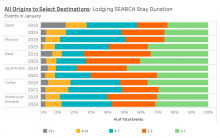 Sojern shares its latest data highlighting that the Middle East continues to build on its strong 2022 travel momentum. With relatively quick bouncebacks from COVID-19 in the UAE, and Kingdom of Saudi Arabia (KSA) seeking to secure its place on the tourist map with an ambitious visitor push, it’s looking like strong travel intent to the region will continue well into 2023. As of February, Sojern sees that 2023 flight searches are up year on year (YoY) globally; 72% from APAC, 48% from EMEA, 36% from US & Canada, 30% from LATAM and 23% from Caribbean. With last year’s FIFA World Cup boosting travel recovery in the region, Sojern looks at the current state of play for travel now that the tournament dust has settled.
Sojern shares its latest data highlighting that the Middle East continues to build on its strong 2022 travel momentum. With relatively quick bouncebacks from COVID-19 in the UAE, and Kingdom of Saudi Arabia (KSA) seeking to secure its place on the tourist map with an ambitious visitor push, it’s looking like strong travel intent to the region will continue well into 2023. As of February, Sojern sees that 2023 flight searches are up year on year (YoY) globally; 72% from APAC, 48% from EMEA, 36% from US & Canada, 30% from LATAM and 23% from Caribbean. With last year’s FIFA World Cup boosting travel recovery in the region, Sojern looks at the current state of play for travel now that the tournament dust has settled.
Demand for Regional Hotels Up on 2019 Levels in Many Middle Eastern Countries
Several recent reports highlight that Middle East destinations are leading global travel recovery, in part boosted by Dubai’s 2020 Expo and last year’s World Cup. Sojern’s latest lodging data supports this positive picture and sees that 2023 interest from most origins to the region is high and even above January 2019 levels. Inbound travel demand from African, Asia-Pacific (APAC), and Latin American (LATAM) markets continue to grow with KSA showing one of the most marked increases in demand. The country sees a 541% increase in 2023 versus 2019 international lodging searches from Africa, 358% from Europe, 279% from LATAM, 251% from the United States and 2,547% from Canada. This uplift suggests that their tourist ambitions to draw 100 million visitors annually by the end of the decade appear to be off to a strong start.
Qatar continues to ride the World Cup wave with particularly strong interest from LATAM. Lodging demand from regional Middle East travellers is up 123%, while the rest of the world is also up on 2019 levels; Africa – 95%, Europe – 71%, APAC – 69%, LATAM – 255%, United States – 255% and Canada – 172%. With Formula 1 recently announcing Qatar Airways as a new Global Airline Partner in a multi-year deal, which will see the return of the Qatar Grand Prix in October, as well as a host of leading tech and hospitality events taking place throughout 2023, Sojern will be watching closely to see if travel interest continues to grow.
Lodging searches for Turkey and Egypt have also seen a lift and are currently hovering above 2019 volumes. Egypt’s ongoing travel intent may have been boosted by the country offering direct flights from Doha to Egyptian cities during the World Cup to lure fans and boost tourism. Morocco’s tourism industry has been slower to recover so far but Sojern’s data shows that there’s been considerable growth in 2023 thus far vs 2021/2022. With the Moroccan government seeking to bring the sector back to the revenue and tourist figures it recorded before the pandemic, Sojern foresees continual growth throughout the rest of the year.
Global Travellers to Middle East Seek Shorter Stays Compared to Pre-Pandemic Levels
Compared to 2019 across the board, Sojern sees that global travellers are less likely to stay over two weeks in the same hotel in 2023. With global travel restrictions now largely lifted, it is possible that travellers are seeking to plan multiple short stays within a single trip to vary their experience. Also considering the availability of intra-regional flights with low-cost carriers in the region, travellers may prefer planning to visit for a few days each in several Middle Eastern countries.
Sojern also sees that a higher portion of travellers are considering stays of just one day, especially in Qatar. This may be due to travellers adding it to their itinerary because of World Cup clout or potentially because many travellers use the Middle East as a stopover when flying between Asia Pacific and Europe. Qatar Airways also offers stopover packages, where travellers can stay in Qatar before heading off to their final destination to visit two destinations in one trip. KSA is also seeing interest in longer stays of up to a week. This suggests that their total tourism expenditure of $43.33bn in 2022, an increase of 93 percent over the previous year, may be helping the country reach their goal of attracting 25 million tourists during 2023.
US Travellers Remain a Key Market for Middle Eastern Countries
Sojern also sees that over 75% of US travellers are staying in the region for more than eight days. Compared to other long-haul destinations in Asia they are more willing to stay for over one week making them high-value travellers for Middle Eastern destinations. Many countries, including KSA, have made tourist visas relatively easy to obtain, while others like Oman, have scrapped many tourist visas altogether to attract more valuable visitors.
“With our latest data showing that travel intent to the Middle East is holding strong, it’s heartening to see that the World Cup has given the region a boost,” said Stewart Smith, Managing Director MEA&I Sojern. “Long flight times and potential misconceptions regarding the region as a travel destination may continue to drive relatively cautious travel planning. However, a flurry of ongoing events in the region combined with sustained and powerful marketing strategies from newer gulf destinations such as Kingdom of Saudi Arabia will continue to influence valuable US travellers and other global visitors. Never underestimating the power of data, activating multichannel activation at scale and ensuring marketing is always on will help set hoteliers and destination marketers up for success in this pivotal time for tourism.”
 Tourism Breaking News
Tourism Breaking News


